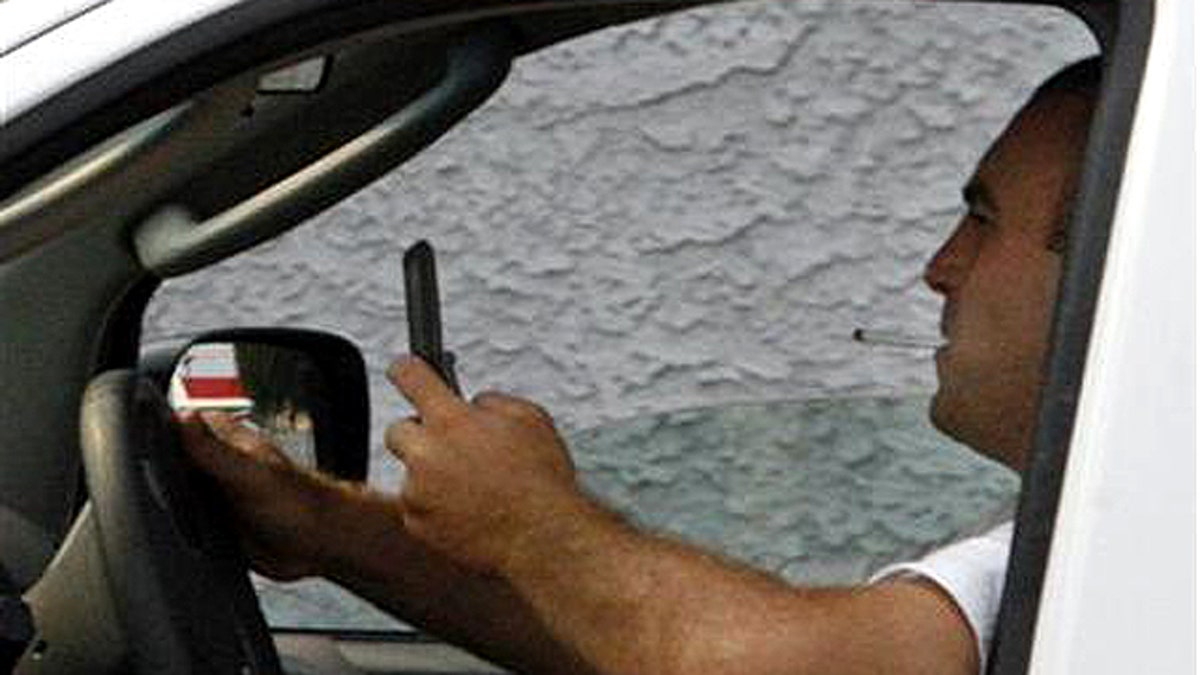
A man uses a cell phone while driving in Burbank, California June 25, 2008. (Reuters/Fred Prouser)
It's easy to vilify new technologies -- from hacking to tracking -- but nowhere are the potential perils of digital wonders more apparent than in the car.
Texting, talking, and tweeting behind the wheel are real threats, yet despite the dangers of distracted driving, there's no turning back the clock. We're not going to give up GPS for paper maps or Pandora for 8-track tapes.
So how to deal with these new technologies that threaten to overwhelm us and put our safety at risk?
Some solutions are obvious. People cannot safely drive a car and text on a phone or hold it up to their ear and chatter away. Every state should make such behavior a primary violation and pull drivers over in earnest for breaking the law.
Unfortunately, according to the Governors Highway Safety Association (GHSA), in only 8 states and Washington, D.C., can the police stop a driver just for using a cellphone while driving. Surprisingly, not all states expressly ban texting while driving: The GHSA says that only 30 states (and D.C.) consider this a primary violation.
But even if handheld talking and texting were banned across the country, it wouldn't eliminate the growing array of in-car distractions. Sexting while you're behind the wheel isn't the only problem.
BMW has a color-coded menu system on its in-dash LCD with a jog dial for flipping through everything from music to air-conditioning. Lexus uses a mouse-like controller to perform similar functions; Audi has a touchpad that drivers can scribble letters on. There are more buttons, voice controls, and touch screens now than ever before, and drivers, well, they're distracted.
However, the problem isn't just the technology, it's us.
In this instant-on, there's-an-app-for-that culture, we take technology like some people pop pills. Simply download the solution and start it right away, forget about reading the instructions or learning how to use it properly. That's fine if you're just playing an iPhone game, but dealing with a car's built-in computer can be a life or death matter.
In a world in which you often have to read the owner's manual just to open the trunk, drivers need to realize that it takes practice to master even the most advanced and useful new car features.
For example, voice control systems -- even the best that recognize natural language -- are only helpful if you're alone in the car (just try telling the kids to shut up while you talk to the car). Navigation systems can warn you if there's congestion ahead, but a poorly positioned screen can take a driver's eyes off the road for too long.
Consequently, critics of new in-car technologies protest that the only good technology is a technology that doesn't require driver input, such as airbags or electronic stability control that can prevent skids and rollovers. But taking this approach would dead-end some important safety technologies.
A primary example is anti-lock braking systems (ABS). If you learned to drive in the snow before this technology was available, you were taught to pump your brakes in a slide. But ABS changed the rules and drivers had to learn a new technique: Slam on the brakes as hard as possible.
Rear-view camera systems are a more recent example. By letting drivers see objects immediately behind them, these cameras improve safety and lower the chances that a child will be backed over (2 children are killed this way every week in the U.S., according to safety advocacy group Kids and Cars).
But it takes practice to back up safely using a rear-view camera. I witnessed one car company rep rip off a side-view mirror using a camera because he forgot that he also had to check his mirrors. So dealing with such technology is a learning curve we all must climb.
Does this mean anything goes, and drivers will have to fend for themselves? Clearly not. Just as laws are needed to teach people not to text and drive, some high-tech habits create too great a cognitive load. New rules for the road will help us deal with new technologies, but it's just as important for us to learn new skills. After all, most of us can switch radio stations without crashing into a concrete barrier.
So how should we deal with new technologies? Practice, practice, practice.
